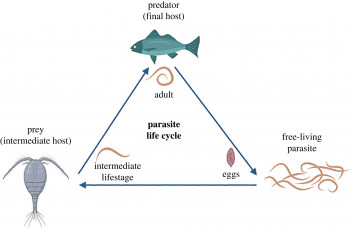News
New study reveals how parasites shape complex food webs
Centre for Biodiversity and Sustainability Centre for Complex Systems Faculty of Science and Engineering24 April 2024
A new study published today in Proceedings of the Royal Society B sheds light on how parasites influence the intricate relationships between predator and prey populations.
Researchers from the Faculty of Science and Engineering at Queen Mary University of London have developed a novel analysis to explore how factors like parasite virulence and infection probability affect the coexistence of species in a complex predator-prey-parasite system.
"Food webs are intricate networks where species interact with each other," says Dr Weini Huang Reader in Mathematical Biology. "Parasites, a massive but often overlooked component of these webs, can significantly impact their stability by affecting both predator and prey populations."
The research team is a new interdisciplinary collaboration between the group of Professor Christophe Eizaguirre, Professor of Evolutionary and Conservation Genetics in the school of Biological and Behavioural Sciences and Dr Weini Huang, Reader in Mathematical Biology in the School of Mathematical Sciences. Together with two earlier career researchers, Ana C. Hijar Islas and Amy Milne, they thoughtfully investigated this complex system through mathematical analysis and stochastic simulations, which considers microscopic events like reproduction, death, competition, infection, and predation at the individual level.
The study revealed that stochasticity, random fluctuations in population sizes, plays a significant role in determining whether species coexist or go extinct, particularly at the boundary between these states.
Dr Weini Huang and Amy Milne played a crucial role in developing the model's mathematical framework. Dr Huang explains: "We found that the relative abundance of infected and uninfected individuals can be reversed between the prey and predator populations. This counterintuitive finding suggests that the interplay of direct and indirect parasite effects plays a significant role in shaping infection prevalence throughout the food web."
Professor Eizaguirre emphasises the importance of this research: "Understanding how parasites influence food web dynamics is crucial for predicting the impact of environmental changes on ecosystem health but also risks of spread of invasive diseases. Our findings provide a valuable framework for exploring risks of certain parasites to become invasive as they are move with their hosts"
"Our findings provide a valuable foundation for understanding how these systems evolve over time," concludes Dr Weini Huang. The team have developed a further study built upon this framework by incorporating the evolution of key parameters, such as reproduction costs and infection probability, under the combined influence of ecological and evolutionary pressures."
This research has the potential to inform conservation efforts by providing a deeper understanding of how parasites can influence the resilience of ecosystems. By incorporating parasite dynamics into ecological models, conservation biologists can develop more effective strategies to protect vulnerable species and maintain healthy ecosystems.
Updated by: David Lockwood





